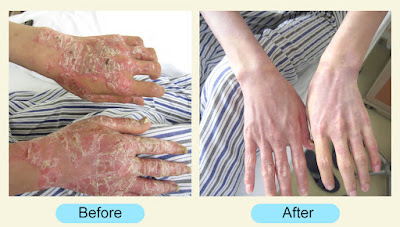Psoriasis is a chronic skin disease characterized by red patches on the skin, often accompanied by silvery-white scales of dead skin cells. It is not contagious. Psoriasis is believed to be an autoimmune disease, meaning the body's defense system attacks healthy cells in the body.
Psoriasis is the most common autoimmune disease. Researchers think it probably occurs when the body's immune system attacks healthy cells, mistaking them for dangerous substances. Up to one-third of people with psoriasis may also have a form of arthritis called "psoriatic arthritis," in which the immune system also attacks the joints.
 |
In many cases, psoriasis goes away and then flares up again. The triggers that bring on psoriasis include: stress, dry air, infections, skin injuries, some medicines, too much or too little sun, cold weather, drinking too much alcohol and smoking.
If you have a weakened immune system, you may experience more severe symptoms from psoriasis. A weakened immune system comes with rheumatoid arthritis, chemotherapy and AIDS.
There are a variety of psoriasis types. These include:
Plaque. This is the most common type of psoriasis. This produces thick, red patches of skin covered by flaky, silver-white scales.
Erythrodermic: This is the least common type of psoriasis. The skin redness is very intense and can cover your entire body with a red, peeling rash that can itch or burn intensely.
Guttate. This affects people younger than 30 and is usually triggered by a bacterial infection such as strep throat. It's marked by small sores on the trunk, arms, legs and scalp.
Inverse. The symptoms of inverse psoriasis include skin redness and irritation in the armpits, groin, and in between overlapping skin. It's more common in overweight people and is worsened by friction and sweating.
Pustular. This is an uncommon type of psoriasis that can occur in large patches. It generally develops pus-filled blisters after your skin becomes red and tender.
Nail. The nails of fingers and toes become pitted. They can grow abnormally with discoloration. Psoriatic nails may become loose and fall off.
Scalp. Psoriasis on the scalp appears as red, itchy areas with silvery-white scales. If you scratch your scalp, flakes of dead skin fall to your shoulders.
No comments:
Post a Comment